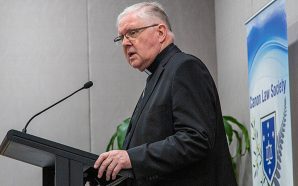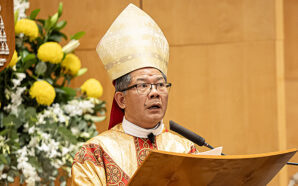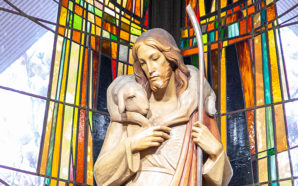As a young student attending Catholic schools in the 1970s and 80s in the Latrobe Valley in country Victoria, there was always a presence in our classroom of the Catholic commitment to assisting people who were disadvantaged or at the margins of our society.
Catholic schools in the Valley – and indeed across Australia – had a long tradition of serving lower and middle income families and the schools I attended were full of kids from struggling, working class families who in today’s terms, would be described as ‘poor’ or ‘disadvantaged’. I personally knew many families who couldn’t afford the very modest fees charged by Catholic schools and were supported by the generosity of local church communities.
Our teachers – who in those days were a mix of clergy, religious and lay staff – helped us deeply understand why the ‘preferential care for the poor and vulnerable’ was so critical to Catholic social teaching and being true to the example of Jesus Christ.
As an impressionable young man, one of the most poignant examples for me were the Marist Brothers, and in particular, Br Maurie Bambridge, who was so influential in my values education. He, and many of the brothers, devoted decades of their lives working with Indigenous people in remote communities in Central Australia. This witness to the core mission of the Church left an indelible impact on my life and strongly influenced my career choices over the years having worked as the CEO for two Indigenous organisations supporting Aboriginal people experiencing enormous disadvantage, and now serving the work of Catholic education at the national level.
In today’s media we often see stories of the success of Catholic schools, in the academic or sporting arena, and while these examples of excellence are critically important, we don’t often see the work of schools reaching out to those on the edges. This nearly 200-year-old tradition of the Church serving the marginalised is still very present in Catholic education today.
I was honoured recently to spend a day with Dr Frank Malloy, the Head of Marist Schools Australia, visiting three remarkable works of the Marist Brothers in partnership with other passionate Catholic partners. Recognising these are just three of many examples, they are representative of how Catholic schools not only continue to be excellent schools, but also continue to ensure they are relevant and reaching out to the most vulnerable in society.
Pete’s Place located at Blacktown is run by the Marist’s outreach arm, Marist180, and is an alternate pathway for young people aged 12 to 16 years old who have disengaged from school.
The newly-appointed principal Michael Whitton has a passion and energy for working with young people in western Sydney having worked as an assistant principal at St Clare’s Catholic College in Mount Druitt.
With a small staff in a modest building he has grown the school from 15 to 23 students regularly attending, which he attributes to encouraging and recognising young people who attend school regularly.
Michael is adamant that Pete’s Place is not a ‘behaviour school’ and says the staff work with students in a therapeutic way, one on one, many of whom have been seriously traumatised. He says their behaviour might bring them to Peter’s Place, but that is often a symptom of other underlying issues like depression and anxiety. He says the difference is that for many of these young people they are used to being pushed away and at Pete’s Place they don’t get pushed away and the teachers don’t give up on them.
This personalised approach underpins the work of the Marist’s new joint venture with Catholic Education Diocese of Parramatta (CEDP), the Marist Learning Zone (MLZ), which will open to students in Mount Druitt next year. The program will support students for up to 100 days while they are still enrolled in their mainstream school and will provide additional support with the aim of re-engaging students back into school or to support them to find another pathway through vocational programs, apprenticeships or work.
The four Marist and two CEDP staff will create individualised programs to best support each student and for a varying timeframe depending on the student’s needs. CEDP’s program manager Patrick Barrett said the program will support schools in conjunction with other options like wellbeing and counselling services.
The final school we visited was the newly-refurbished John Berne School at Lewisham which was founded in 1998 and has been largely supported by the Marist Brothers and government funding.
The principal Br Mark Paul said creating the right kind of environment and the right kind of opportunities is critical to the success of the students at the school and he offers them a comprehensive program including boat-building, sailing, immersion trips and regular work experience alongside the standard curriculum to broaden students’ experience.
With the capacity to accommodate up to 48 students, Br Mark said the work of the teachers is to help the students tap into their gifts, by exposing them to opportunities and creating an environment where they are respected and valued.
At the heart of these programs and schools lies a deep commitment to the mission of the Church through the Marist charism, and while sharing the faith is often not as explicit as teaching religious education, it is critical to students’ experience of Catholic schooling.
As Br Mark said there is a great thirst for faith with these young people, which is being made alive through their education.
It was a privilege to see the work of St Marcellin alive and well in these three examples of how Catholic schools today remain true to our mission of serving those at the margins of our society.
As a boy going to a Marist school, we prayed every week for the canonisation of the Founder of the Marist Brothers, Marcellin Champagnat. But most importantly we were trained to follow his example in our lives. What a fantastic legacy he and the Marists have given us – today, as much as at any time in our history – still reaching out to the marginalised and providing an excellent Catholic education to the young people in our care.
Christian Zahra is the executive director of the National Catholic Education Commission.
To learn more visit Marist180.org.au, www.thejohnberneschool.org and www.parra.catholic.edu.au.
Donations to support these initiatives are always welcome as are your prayers.








